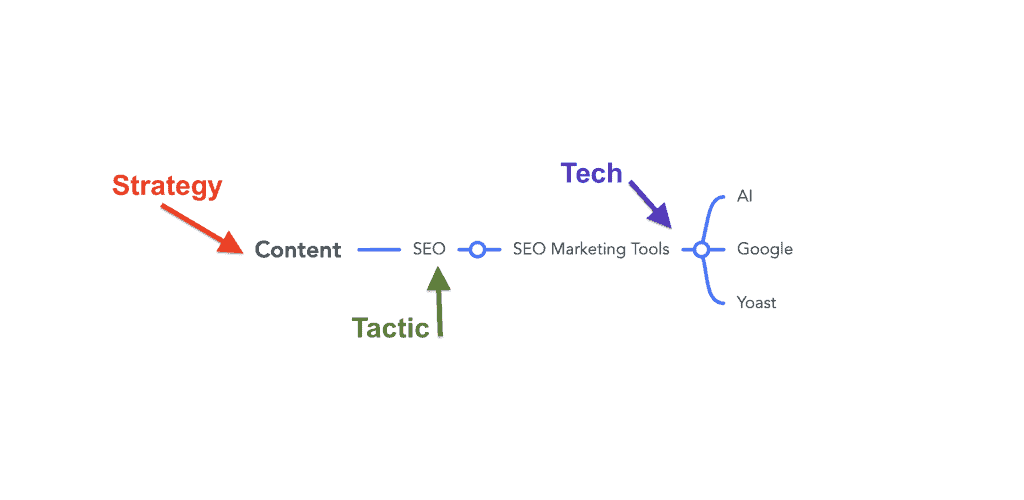In This Article

Given that the world of AI-driven everything is evolving so fast that even Google’s algorithm is going to need therapy to keep up, saying that we’re living in 2050 is a bit of an understatement. But you get the reference, AI technology is impacting everything. And I wanted to know how today’s content marketers are dealing with the changes.
So I asked.
In this guide, I’m going to give you an overview of AI SEO strategies and then feature 14 case studies of content marketers just like you.
Short Summary
- AI SEO strategies are revolutionizing digital marketing by automating tasks, driving traffic and providing insights.
- Leverage AI-generated content to optimize content strategies & improve search rankings in 2023.
- Track KPIs such as organic sessions, impressions, keyword rankings & conversions to measure success of AI SEO strategy.
Don’t Let the Phrase “AI SEO Strategies” Confuse You

You’re going to hear people talking about “AI SEO Strategies” — don’t let this confuse you. Marketers love to put “strategies” after any noun. Calling it a strategy doesn’t make it so.
AI SEO — is NOT a strategy. That’s like saying a “calculator” is a strategy or a computer is a strategy. These are tools to help you do a job.
Content marketing is a strategy. SEO is a tactic that’s a part of content marketing. AI a technology that you can use.

What is AI SEO Strategy Then?
Think of AI SEO Strategies as the technologies that you will use to help your ideal customer find you online.
In an age where search engine optimization (SEO) has become a cornerstone of digital marketing, AI SEO strategies are taking the game to a whole new level. Today’s AI-driven SEO tools will help you optimize website content, boost search rankings, and enhance user experience. And all these things will help your ideal customer find you.
But just how does AI fit into the SEO puzzle?
AI is revolutionizing SEO by automating tasks like keyword research, content creation, analysis, and workflow management, ultimately driving more traffic and growing websites by producing optimized content that ranks higher in search engine results. No matter the size or industry, businesses can benefit from using AI-based SEO tools to analyze their websites or content and gain valuable insights on areas needing improvement, such as keyword research, content optimization, meta tags, and link building.
The Role of Artificial Intelligence in SEO
Artificial intelligence plays a crucial role in SEO by automating tasks, analyzing data, and providing insights for better decision-making. Various AI-powered tools can assist with keyword research, analyzing search engine results pages (SERPs), creating content, offering optimization tips, and checking the quality of SEO writing. However, the human touch remains indispensable to ensure the accuracy, uniqueness, and context of the content.
As AI continues to develop, its benefits in SEO will only grow. AI-generated content can help businesses come up with innovative ideas, optimize keyword usage, and boost content quality. This means that businesses that harness the power of AI in their SEO strategies will have a competitive edge, maintaining a strong online presence in an increasingly congested digital world.
The Growing Importance of AI SEO Strategies
As competition intensifies in the digital realm, adopting AI SEO strategies becomes essential for businesses that want to stay ahead of the curve and maintain a strong online presence. By automating tedious tasks and optimizing content, AI-powered SEO is fast becoming the go-to approach for savvy marketers in 2023 and beyond.
Implementing AI SEO Tools for Maximum Results

Implementing AI SEO tools can significantly improve website performance in search engines by analyzing and optimizing various aspects of your online presence, including meta descriptions. However, choosing the right SEO tool and integrating it into your workflow is crucial to maximize the benefits and ensure seamless collaboration between human and machine.
There are a plethora of AI SEO tools available, each with its unique features and capabilities. Some of the most popular tools include Jasper, AlliAI, Pro Rank Tracker, and RankIQ. To get the most out of these tools, it’s essential to understand their strengths and weaknesses and select the ones that best align with your specific needs, budget, and goals.
Choosing the Right AI SEO Tools
Selecting the best AI SEO tools depends on your specific needs, budget, and goals. With a vast array of tools available, ranging from content creation to analytics, it’s essential to assess your requirements and choose the tools that will provide the most value. Some popular AI SEO tools include Twinword, Surfer SEO, SE Ranking, Semrush, Outranking, and Can I Rank, each catering to different aspects of SEO such as keyword research, content optimization, analytics, and voice search optimization.
When selecting AI SEO tools, it’s important to consider the cost and features offered. For example, Semrush offers a free tier, but requires a premium subscription for full access to its features, with plans starting at $119.95 a month. By carefully evaluating the features and costs, you can ensure that you invest in the right tools to make a significant impact on your SEO efforts.
Integrating AI SEO Tools into Your Workflow
Properly integrating AI SEO tools into your workflow is key to ensuring seamless collaboration between human and machine. By incorporating AI-powered tools like Semrush, Frase, AlliAI, and RankIQ into your SEO processes, you can optimize content across different platforms and maximize the benefits of AI.
This approach helps strike the perfect balance between AI-generated content and human input, ultimately leading to better search rankings and improved user experience.
Case Studies: Successful AI SEO Strategies in Action
I reached out to our marketing community and gathered 14 expert SEO tips from industry leaders to help content marketers drive quality traffic to their websites. From focusing on search intent and multi-medium to concentrating on user experience and engagement, these insights from SEO consultants, founders, and managers will keep you ahead of the curve in the ever-developing digital landscape.
Focus On Search Intent and Multi-Medium
We all know the likes of ChatGPT have created a wave of new content.
SEOs and marketers alike are leveraging AI to scale their content output, and why wouldn’t they?
One thing remains a staple in SEO though – search intent. Yes, you can somewhat answer intent with a hastily generated AI article, but the true value is generated by those who can create detailed resources with multiple touchpoints.
For SEO content, having a multi-medium strategy, with the leading content format determined by search intent, will set you apart from the rest.
As an example: Many how-to results are dominated by videos, so from an SEO perspective, a video is required to be competitive. But so is a step-by-step article with supporting images. This means you have 3 mediums to optimize for.
Quality traffic comes from these kinds of content pieces, as they can answer user questions on YouTube, on a website, in featured snippets, in image searches, etc. Multiple touchpoints are key to driving quality traffic.
Ben Poulton, SEO Consultant and Founder, Intellar
Explore Alternative Platforms and Collaborate
Consider where else people are searching beyond traditional search engines. Platforms like Reddit, TikTok, YouTube, and Instagram have become prominent sources of information and discovery for users. TikTok is rapidly developing into a video search engine, offering tremendous potential for content marketers to tap into an engaged audience.
Build relationships with other brands. By collaborating with industry influencers, thought leaders, and complementary brands, marketers can find opportunities to feature their company, contribute guest posts, or engage in various forms of cross-promotion. This generates referring traffic from established sources and enhances brand visibility and credibility within the online community.
Jeremy Galante, Sr. SEO Manager, ClickUp
Work With AI to Improve Content Depth
I’m going to go against the grain and actually recommend you leverage AI. While the writing should primarily come from you, I highly recommend using it to find any gaps in your content.
Remember, Google wants to show the best results in the SERPs, so AI can help you find angles in your content that your competitors haven’t mentioned yet.
AI can also help make your content more in-depth too. While I don’t recommend using it to write your in-depth topics, it’s great for picking your brain and digging deeper into a topic that’s only been covered on the surface by competitors.
AI will make it easier to publish lower-quality content, but it can also seriously level-up content too.
Taylor Scher, SEO Associate, TaylorscherSEO
Incorporate Reddit and Quora Questions
When someone asks a question on Reddit or Quora, 9 times out of 10, it’s following an unsuccessful Google search. The user has likely searched Google for their answer but found that the top-ranking results either didn’t answer their question at all or didn’t answer it fully.
There are several AI tools that pull relevant questions from Reddit and Quora for you, such as Keyword Insights, which you can then include in your content. This will help make your content more useful than competitors, which should help you outrank them.
Will Bourne, SEO Consultant, GrowRoom
Be the Purple Cow and Add Experience
The way to drive quality traffic has always been the same: be the purple cow.
What do I mean by this? It means your content needs to stand out. AI can produce content quickly, and the content can be pretty good with the right prompting. What AI cannot create is E-A-T-worthy content, with emphasis on the first E, Experience.
To be the purple cow, you must be better than AI because that’s the new standard. That’s the new ante in this giant game of poker. Using ChatGPT, Jasper, or any other type of AI writing platform, will not suffice on its own.
There’s no issue using these tools to speed up the process, but to make authentic E-A-T-worthy content, to be the purple cow, you need to add experience to everything. Use first-person language. Be incredibly descriptive that no other person or AI tool can be. Be helpful and be creative.
Add tons of multimedia to this experience-driven asset, and you’ll be the purple cow.
Dan Ansaldo, Owner and SEO Expert, CopyTrends
Use Video Content for Engagement
Use video content to engage your audience and improve your website’s search rankings. By creating engaging and informative videos, you can capture the attention of your audience and keep them on your website longer, which can ultimately improve your website’s search rankings.
Videos can be optimized for search engines by including relevant keywords in titles, descriptions, and tags. By incorporating video into your content strategy, you can stand out in an ever-growing digital landscape and drive high-quality traffic to your website. For example, creating product demo videos or educational tutorials can help attract and convert potential customers.
Ben Lau, Founder, Featured SEO Company
Align AI With Your Content Strategy
Don’t forget the importance of strategy. I heard an analogy that really resonated with me where AI is very similar to the phone where—by itself—it can be powerful, but only with the right strategy, goals, and execution can it really drive those results and quality traffic.
While we can lean on AI to help, it (at least at this time) shouldn’t be the driver. It still needs to be aligned with the overall marketing or content creation goals.
Gresham Harkless Jr., Founder, Blue16 Media
Optimize Internal Linking and Topical Maps
With the writing and publishing of online content becoming easier than ever, the relationships you create between pages will have even more of an impact on performance.
While the quick and easy methods for generating content can bring success, taking a conscientious approach to your content publishing will produce the best results long term.
As search engines continuously enhance their understanding of semantic entities, they aim to identify topics and build connections between their related sub-topics through natural language processing.
By structuring your content in a rational flow from your focus verticals, to pillar categories, to keyword clusters, you can create a topical map that makes internal linking more coherent and effective.
With a logical internal linking structure, you can guide both users and search engines toward a comprehensive understanding of your content and supercharge the link equity across your site. Aim for longevity while others focus on shortcuts.
Joe Cowman, Head of SEO, FATJOE
Leverage User-Generated Content
User-generated content (UGC) has the ‘automatically produced’ nature of AI, but where it differs is it’s genuinely valuable to real people.
It still can’t offer the nuances and real-life use cases that people can.
Let’s say you’re creating a list of the best marketing tools, for example. Only real people can provide real-life use cases and innovative ways they’ve manipulated those tools to get more out of them.
After you have published UGC, you can tap into the networks of those people to generate links, shares, and engagement. Because everybody loves to be an expert!
I did this by tagging all the experts and software companies that featured in our UGC. They then engaged and shared like crazy, ultimately giving me:
– Thousands of impressions
– #1 ranking article written for free
– New professional relationships
Will Rice, SEO and Marketing Manager, MeasureMinds
Acquire High-Quality Backlinks
Backlinks are links from other websites that point back to your website. They serve as a vote of confidence and authority, signaling to search engines that your content is valuable and trustworthy. While AI can help create content, the quality and relevance of backlinks remain crucial in driving quality traffic.
Focus on building high-quality backlinks from authoritative websites in your industry. This can be achieved through guest blogging, influencer collaborations, or by creating valuable content that naturally attracts backlinks. By prioritizing backlink acquisition, content marketers can improve their website’s visibility, and organic rankings, and ultimately drive quality traffic to their website.
Simon Brisk, Director, Click Intelligence Ltd
Prioritize Content Quality and Relevance
To drive quality traffic to their website, content marketers must prioritize creating relevant and high-quality content. Research suggests that websites with higher-quality content rank higher than those without.
Having a wide variety of topics and regularly updating existing content will help keep your website engaging and relevant. Content should also include relevant keywords and phrases that relate to the topic being discussed, as this helps increase organic search visibility.
Darryl Stevens, CEO, Digitech Web Design
Combine E-A-T Principles With AI
Incorporate E-A-T principles (Expertise, Authoritativeness, Trustworthiness) while designing your SEO strategy. Quality input for AI tools ensures accurate content output, crucial for regulated industries like pharmaceuticals.
Remember, Google values content that answers search intent, regardless of whether it’s AI-generated. Therefore, create content that effectively answers users’ queries, leveraging AI for accuracy and speed.
AI excels in automating repetitive tasks, freeing up time for strategic thinking. Use AI to its full potential, but remember, strategic planning and decision-making are uniquely human tasks. Use the time saved by AI for this. Focus on enhancing user experience and delivering high-quality, authoritative content to build trust. AI assists, but human intelligence drives the strategy.
Stefano Gorgoni, SEO Expert, Up Vision
Infuse Human Touch Into Content
What most content marketers cannot realize is that the content that the search engine bots are trained to search for and rank is something that only human writers can bring to the content by leveraging their “personal experience” factor, an important part of the E-A-T criterion.
So, content marketers should capitalize on this aspect and make their content richer with human perspectives and experiences. This will help attract the right traffic and leads for your content, an audience that can closely relate to the solutions you’re offering.
The aim is to align your content with your audience as closely as possible. This can’t be done with AI alone. While AI can help you come up with a generic outline for your content, it can’t do much in rendering a personalized, empathetic tone and voice to the content.
Here’s your chance to stand out. Among the tons of AI-generated content out there, you can help your content shine brighter than all others by including a human touch in it.
Astha Verma, Co-founder and CEO, WrittenlyHub
Concentrate on User Experience and Engagement
One specific SEO tip for content marketers to drive quality traffic to their websites is to prioritize user experience (UX) and engagement. While AI can assist in content creation and search result analysis, the goal is to provide value to human users.
Focus on creating high-quality, informative, and engaging content that resonates with your target audience. Optimize your website’s loading speed, mobile responsiveness, and ease of navigation to enhance UX.
Encourage user interaction through comments, social sharing, and interactive elements. By prioritizing UX and engagement, you can attract and keep quality traffic, leading to improved search rankings and increased organic visibility.
Syed Anas Ali, SEO Manager and SEO Content Writer, Pivotal B2B
Overcoming Challenges in AI SEO Implementation
Implementing AI SEO strategies comes with its fair share of challenges, such as striking the right balance between AI and human input, ensuring data privacy and security, and navigating the ethical implications of using AI for personalization. However, overcoming these challenges is essential to fully harness the potential of AI SEO strategies and reap the benefits they offer.
By addressing these challenges head-on and developing a comprehensive AI SEO implementation plan, businesses can ensure they maintain a strong online presence while adhering to ethical standards and safeguarding user data. This involves continuous monitoring, evaluation, and adaptation of AI SEO strategies in response to emerging trends, technologies, and challenges.
Balancing AI and Human Input
Striking the right balance between AI-generated content and human input ensures high-quality, engaging content that resonates with users. AI algorithms may be fast and accurate, but they often lack the creativity and intuition of humans, making the human touch indispensable in the content creation process.
By leveraging the strengths of both AI and humans, businesses can optimize their content strategy and ensure their website resonates with their target audience.
Ensuring Data Privacy and Security
Data privacy and security are crucial when implementing AI SEO strategies, as businesses must protect user information and comply with regulations. This involves putting in access control measures like authentication, authorization, and encryption; monitoring access to sensitive data; and reviewing access rights regularly.
By prioritizing data privacy and security, businesses can build trust with their users and ensure a seamless AI SEO implementation.
Evaluating the ROI of AI SEO Strategies

To determine the success of your AI SEO strategies, it’s essential to evaluate their return on investment (ROI). This involves tracking key performance indicators (KPIs) and adapting your strategy based on data analysis.
By monitoring KPIs and making data-driven decisions, businesses can ensure their AI SEO strategies deliver the desired results and maintain a strong online presence.
Key Performance Indicators (KPIs) for AI SEO
KPIs for AI SEO include organic traffic, search rankings, user engagement, and conversion rates, helping businesses measure the success of their AI SEO efforts. By tracking KPIs like search impressions, keyword rankings, organic sessions, bounce rate, and conversions, businesses can determine the effectiveness of their AI SEO strategies and identify areas for improvement.
By understanding the KPIs associated with AI SEO, businesses can make informed decisions about their SEO strategies.
Adapting Your Strategy Based on Data
Continuously analysing data and adapting your AI SEO strategy ensures ongoing improvement and long-term success in the ever-evolving digital landscape. By staying on top of website analytics, user behavior, search trends, and keyword performance, businesses can spot opportunities for optimization and make data-driven adjustments to their AI SEO strategies, ensuring they remain competitive in the digital arena.
AI for SEO is a powerful AI SEO tool for businesses to stay ahead of the competition and maximize their online visibility by leveraging AI SEO strategies and seo optimization techniques.
Summary
AI SEO strategies have the potential to revolutionize digital marketing, driving better search rankings, increased organic traffic, and enhanced user experiences. By understanding the role of AI in SEO, selecting the right tools, implementing key tactics, and overcoming challenges, businesses can harness the power of AI SEO to maintain a strong online presence in the ever-evolving digital landscape. Embrace the future of SEO and unlock the power of AI to elevate your digital marketing game.
Frequently Asked Questions
What is the AI strategy for SEO?
AI strategy for SEO involves leveraging AI tools to optimize and improve a website’s organic search performance. AI-based tools can analyze data, help determine which pages are ranking above yours, and provide advice on how to improve the visibility of your website in search engine results.
How to implement AI in SEO?
Implementing AI in SEO is easy with the right advice. Content optimization and keyword use are important aspects to consider when using AI to enhance your search engine rankings. Additionally, topic clusters should be created to provide users with the answers they’re looking for. Optimizing content length can ensure the best possible results.
What are the top 5 SEO strategies?
If you’re looking to optimize your ecommerce website for organic search engine traffic, the top five SEO strategies are improving website speed and performance, optimizing content around relevant keywords, building quality backlinks, optimizing title and meta descriptions, and creating an XML sitemap.
These strategies will help your website show up higher in search engine rankings and drive more qualified traffic to your site.
What is SEO in AI?
SEO in AI is a form of search engine optimization that uses Artificial Intelligence (AI) to help identify and improve areas of a website or webpage’s organic performance. AI algorithms are able to analyze website data faster and more accurately than manual processes, leading to improved rankings and visibility.